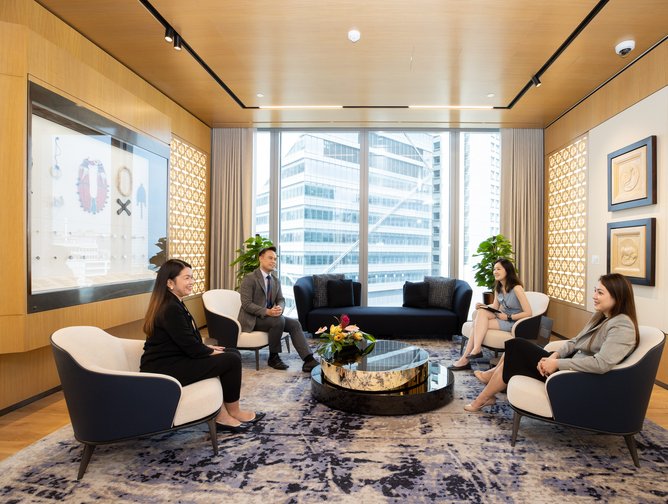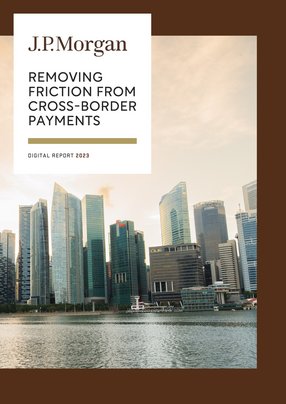J.P. Morgan: removing friction from cross-border payments
When Christine (Jang) Tan talks to us from her office in Singapore, she has just returned from Sibos – the landmark financial conference held in Amsterdam. It’s a major event for J.P. Morgan. Indeed, several of the company’s executives participated in panel discussions and debates at the conference, held in person for the first time in three years.
J.P. Morgan showcased Confirm powered by LIINK, a global account validation service designed to enhance the efficiency of cross-border payments. Confirm runs on the ONYX platform, the firm’s blockchain division. Confirm is the world’s first bank-led, production-grade, peer-to-peer blockchain network that has the ability to verify over 2bn bank accounts from over 3,500 financial institutions1,2.
“We are propelling solutions that address the demands of customers globally – that means they need to be agile, nimble and frictionless,” says Jang. “We have that ability, as we can leverage global infrastructure and incorporate local best practices to our solutions, customising them to the specific client and industry segments, including strategic partnerships to enable an end-to-end payments ecosystem. We also featured our cross-currency proposition customised for banks, fintechs, corporates, and non-bank FIs.”
J.P. Morgan, led by the ONYX team, also attended the Fintech Festival in Singapore. As a key foreign bank, the team is working closely with various central banks around the world, including the Monetary Authority of Singapore. The aim of this is to support new areas of innovation leveraging blockchain technology, with the goal of enabling the movement of money to be faster, better, more cost effective, and take place in a secured manner.
Jang works in J.P. Morgan’s Payments business, heading up Financial Institutions Group Sales in APAC. Not only is Payments a key part of J.P. Morgan’s push in redefining the future of finance, APAC is also a region that has historically been at the forefront of innovation with real-time payments and continues to be a torchbearer to this day.
Impressive credentials underline J.P. Morgan’s scale
“We operate with in-country presence in 16 markets,” Jang says. “We support 18 markets from a client segment standpoint within Asia.”
And then of course they move their flows on a global basis. In APAC alone, the Payments business operates hubs in Manila and Mumbai, which facilitate some of the treasury services and trade processing that J.P. Morgan carries out on behalf of its clients.
J.P. Morgan is regarded as the number one US dollar clearing bank globally, processing almost US$10tn a day in payments.
With such large volumes at stake, the company is keenly aware of its responsibilities around cybersecurity and protecting clients’ money. “That cybersecurity aspect is very critical and in our connections with all the banks, that's one of their key priorities – to have not just a trusted partner who innovates, but the ability to execute securely,” Jang says. “That's very critical, particularly in Asia where you've got a lot of central banks as well as regulators and a complex landscape.”
Sheer volume means cyber becomes key focus
That duty of care comes with expected levels of best practice: large financial institutions and emerging fintechs alike expect their partners to act impeccably, particularly when it comes to complying with legal and regulatory obligations or safeguarding systems from attack. “While we do share best practices, we also expect the same in terms of the companies [that we partner with] actually adhering to certain standards. It's really to protect the entire community.”
When she looks at how J.P. Morgan is likely to invest its resources in the future, Jang says: “We have to keep developing, and there has to be a cyber component that we continue to invest in. On blockchain, the use cases will continue and we've leveraged Confirm as one of our applications for banks, non-bank financial institutions, corporates and fintechs to use.
“We also just recently had the announcement with VISA B2B, who will be leveraging Confirm to facilitate their payment flows cross-border as well.”
When you’re working at such an astronomic level, it takes some bright-shining stars to inspire you. Within J.P. Morgan, Jang says she looks up to Takis Georgakopoulos, the Global Head of J.P. Morgan’s Payments division. “He was previously my boss when he ran the MNCs Corporate Banking business, and brings a unique strategic background to his current role. His vision of bringing together four discrete businesses under a single Payments umbrella is what differentiates us today, enabling the bank to provide end-to-end pay-in, pay-out cash management and trade finance capabilities to our clients. Today, we process almost US$10tn in payments daily in more than 120 currencies and over 160+ countries across the world, and we’re only getting started on this journey.”
A Singaporean native, Jang takes inspiration from the country’s late founding father and first prime minister, Lee Kuan Yew, as well. “Mr. Lee put Singapore on the map, and the financial services industry thrived under his leadership,” Jang says. “It's been growing as a key financial hub globally so I’m really inspired by his journey running the country.”
J.P. Morgan’s ‘three Cs’ approach to payments
Within its payments business in APAC, J.P. Morgan takes an approach that Jang calls the ‘three Cs’: client, collaborator and competitor.
On a client side, the firm is obsessively focused on innovating to support its clients with the rollout of new features and functionality. J.P. Morgan is a co-founder – alongside Singaporean bank DBS and sovereign fund Temasek – of an entity called Partior. The vision for Partior is to facilitate multi-bank settlement on the blockchain in multiple currencies. The firm has facilitated live transactions settling Singapore and US Dollars, and is in the process of adding settlement banks to facilitate additional currencies – including Euros, Japanese Yen and Chinese Renminbi.
For J.P. Morgan, collaboration is key to growth in the Payment business. A prime example is the partnership with European car manufacturer Volkswagen to create Mobility Payments Solutions, focused on the future of cars and how payments can drive innovation through the auto segment. The company continues to look at additional partnerships that it might leverage in Asia – whether that’s with fintechs, aggregators, financial institutions, nonbanks or corporates. The firm also conducted strategic acquisition and alliances with Cleareye.AI, and the latest in-region partnership was with In-Solutions Global (ISG), a leading payment solutions provider.
“Those are collaboration aspects where we would look at whether we want to partner with them, invest in them, and then leverage their technology to support our solutions at the end of the day,” Jang explains.
Finally, on competition, J.P. Morgan does not allow its size or scale to cloud its judgement of rivals in the market. “Clearly we do face competition, with fintechs these days becoming more prevalent,” Jang elaborates. “But I do think having competition is healthy. Ultimately, it’s about benefitting the consumers who have the ability to choose their payment options – whether it's through banks, wallets or fintechs. And J.P. Morgan wants to be part of partnerships that deliver for clients.”
Blockchain a key driver behind payments
Jang is a firm believer in the possibilities brought about by blockchain, and expects the decentralised technology to form a key pillar of J.P. Morgan’s strategy as the company prepares for the future of payments. Jang explains: “We are working globally on opportunities to leverage the technology and apply them to various requirements and solutioning – whether it's on the markets front, tokenisation, real-time movement of money and cross-border payments.”
In addition to using SWIFT and ISO as the payment rails for cross-border transactions, J.P. Morgan is seeking to improve the sharing of data in real-time with Liink – the world’s first bank-led, production-grade, peer-to-peer blockchain network for information sharing – and Confirm, an application for global account validation. This will reduce timescales for banks, cutting down on laborious tasks that need to be carried out manually while lowering rejection rates at the same time.
The company is working with a lot of different companies to facilitate cross-border exchange of that data into different corridors, particularly when it comes to demand for remittances associated with overseas workers, who want to send money back home to markets like Indonesia, India, Bangladesh and Sri Lanka to support their family and communities. J.P. Morgan is expanding the service into the Philippines, Vietnam and Thailand.
As she looks ahead to a promising future – one in which J.P. Morgan will play an undoubtedly pivotal role – Jang neatly summarises the pin-sharp focus of its Asia Pacific payments team: “We believe that seamless and secure payment solutions can help our clients and their business to grow, diversify, and thrive by enabling rails for companies, financial institutions, and consumers to pay anyone by any method or channel from anywhere, anytime.” It’s not a straightforward brief – end-users want everything, and they want it now – but if any company has the track record behind it to make it happen, it’s J.P. Morgan.




- Christine (Jang) Tan


